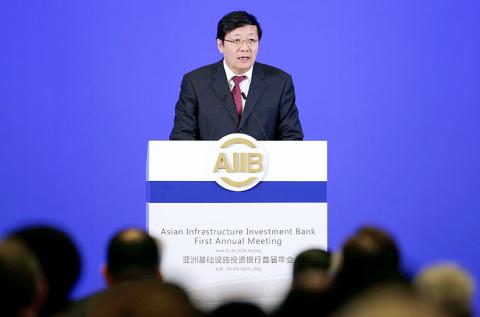Chinese Minister of Finance Lou Jiwei (樓繼偉) yesterday voiced concerns about Britain’s vote to leave the EU, with the policymaker saying it has heightened market uncertainty, although some analysts expect a limited impact on the Chinese economy.
The “Brexit” decision “will cast a shadow over the global economy... The repercussions and fallout will emerge in the next five to 10 years,” Lou said at the first annual meeting of the Asian Infrastructure Investment Bank in Beijing.
“It’s difficult to predict now,” he said. “The knee-jerk reaction from the market is probably a bit excessive and needs to calm down and take an objective view.”

Photo: Reuters
Stock markets around the world plunged in the wake of the referendum while the pound also plummeted.
Lou’s views were separately echoed by other economists at the World Economic Forum (WEF) in China’s northern city of Tianjin.
“It’s hard to talk about and judge the direct impact on China’s economy,” said Huang Yiping (黃益平), a professor at Peking University and a member of the central bank’s monetary policy committee.
“If [Brexit] is an important landmark in terms of a reversal of globalization, I think that’s very bad for the world, it’s very bad for China,” Huang said.
Tsinghua University professor Li Daokui (李稻葵) was more optimistic on the referendum’s effects on the world’s second-largest economy.
“China is perhaps one of the least impacted economies in the world by the event of Brexit,” he told an audience at the WEF. “The only short-term impact I can think about is the exchange rate of the renminbi [yuan]... But I do think within a few trading sessions that situation will very quickly subdued.”
Also speaking at the forum was economist Nouriel Roubini, famed for predicting the global financial crisis, who said the decision to leave the EU “creates a whole bunch of financial, economic, political and geopolitical uncertainties.”
It could be the “beginning of the disintegration” of the bloc of countries, the euro zone or the UK, Roubini said.
“I don’t expect a global recession or another global financial crisis,” he added. “I think the impact of Brexit is significant but not of the same size and magnitude of the one we had 2007 to 2009.”
JP Morgan global investment management Asia Pacific CEO Michael Falcon said he expects more market volatility but does not think the vote would derail a global recovery.
“It is a shock, not a crisis and so far markets seem to be handling this pretty well,” Falcon said at the WEF.

UNCERTAINTY: Innolux activated a stringent supply chain management mechanism, as it did during the COVID-19 pandemic, to ensure optimal inventory levels for customers Flat-panel display makers AUO Corp (友達) and Innolux Corp (群創) yesterday said that about 12 to 20 percent of their display business is at risk of potential US tariffs and that they would relocate production or shipment destinations to mitigate the levies’ effects. US tariffs would have a direct impact of US$200 million on AUO’s revenue, company chairman Paul Peng (彭雙浪) told reporters on the sidelines of the Touch Taiwan trade show in Taipei yesterday. That would make up about 12 percent of the company’s overall revenue. To cope with the tariff uncertainty, AUO plans to allocate its production to manufacturing facilities in

TAKING STOCK: A Taiwanese cookware firm in Vietnam urged customers to assess inventory or place orders early so shipments can reach the US while tariffs are paused Taiwanese businesses in Vietnam are exploring alternatives after the White House imposed a 46 percent import duty on Vietnamese goods, following US President Donald Trump’s announcement of “reciprocal” tariffs on the US’ trading partners. Lo Shih-liang (羅世良), chairman of Brico Industry Co (裕茂工業), a Taiwanese company that manufactures cast iron cookware and stove components in Vietnam, said that more than 40 percent of his business was tied to the US market, describing the constant US policy shifts as an emotional roller coaster. “I work during the day and stay up all night watching the news. I’ve been following US news until 3am

Taiwan will prioritize the development of silicon photonics by taking advantage of its strength in the semiconductor industry to build another shield to protect the local economy, National Development Council (NDC) Minister Paul Liu (劉鏡清) said yesterday. Speaking at a meeting of the legislature’s Economics Committee, Liu said Taiwan already has the artificial intelligence (AI) industry as a shield, after the semiconductor industry, to safeguard the country, and is looking at new unique fields to build more economic shields. While Taiwan will further strengthen its existing shields, over the longer term, the country is determined to focus on such potential segments as

COLLABORATION: Given Taiwan’s key position in global supply chains, the US firm is discussing strategies with local partners and clients to deal with global uncertainties Advanced Micro Devices Inc (AMD) yesterday said it is meeting with local ecosystem partners, including Taiwan Semiconductor Manufacturing Co (TSMC, 台積電), to discuss strategies, including long-term manufacturing, to navigate uncertainties such as US tariffs, as Taiwan occupies an important position in global supply chains. AMD chief executive officer Lisa Su (蘇姿丰) told reporters that Taiwan is an important part of the chip designer’s ecosystem and she is discussing with partners and customers in Taiwan to forge strong collaborations on different areas during this critical period. AMD has just become the first artificial-intelligence (AI) server chip customer of TSMC to utilize its advanced